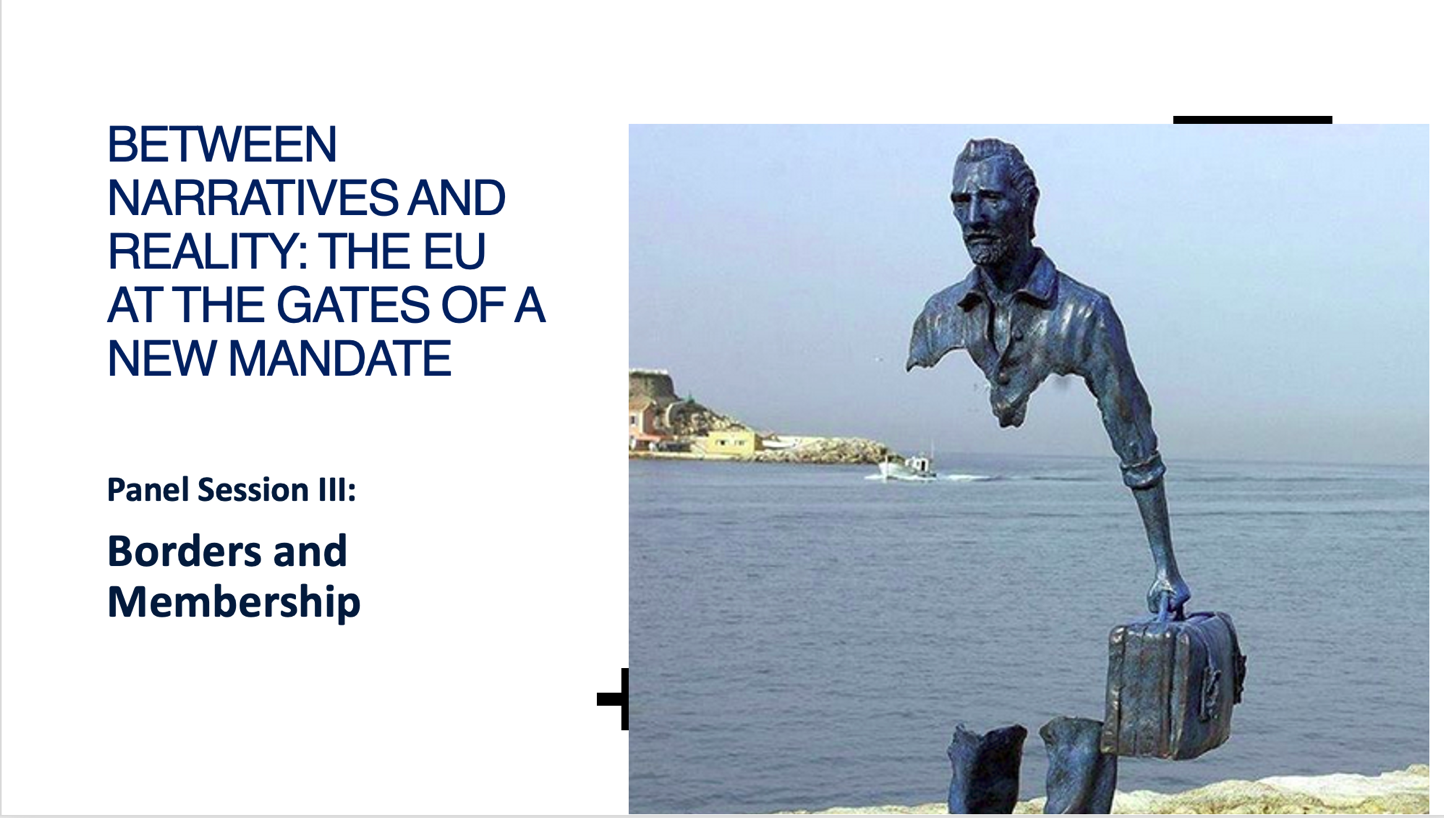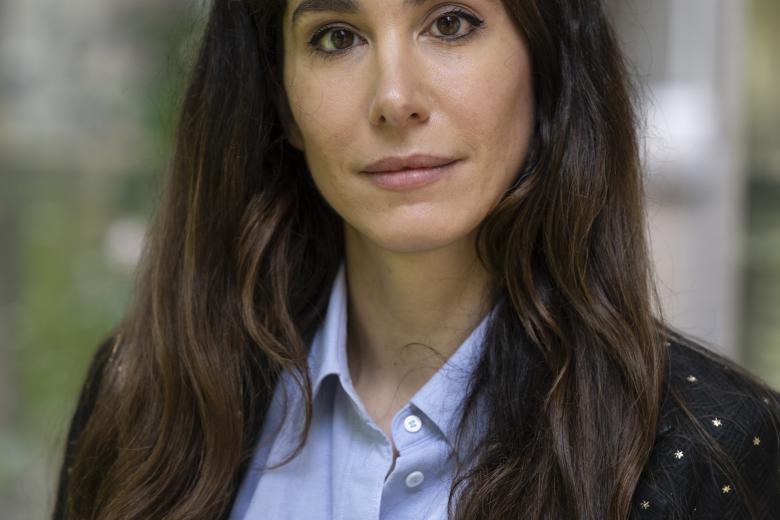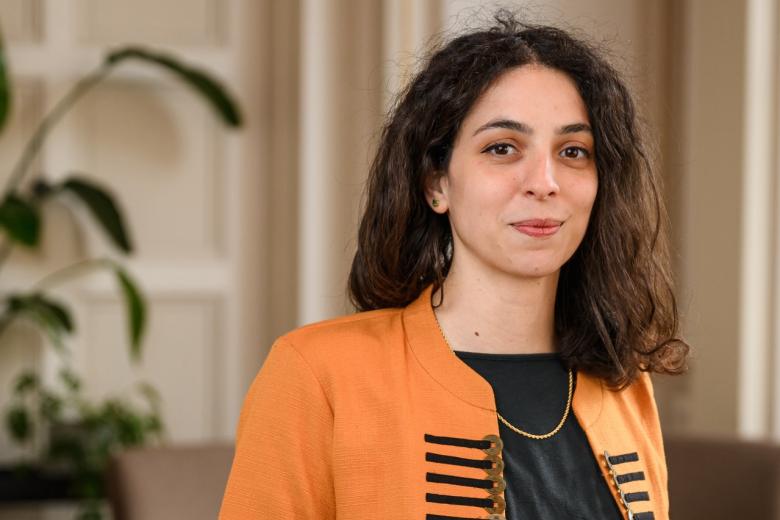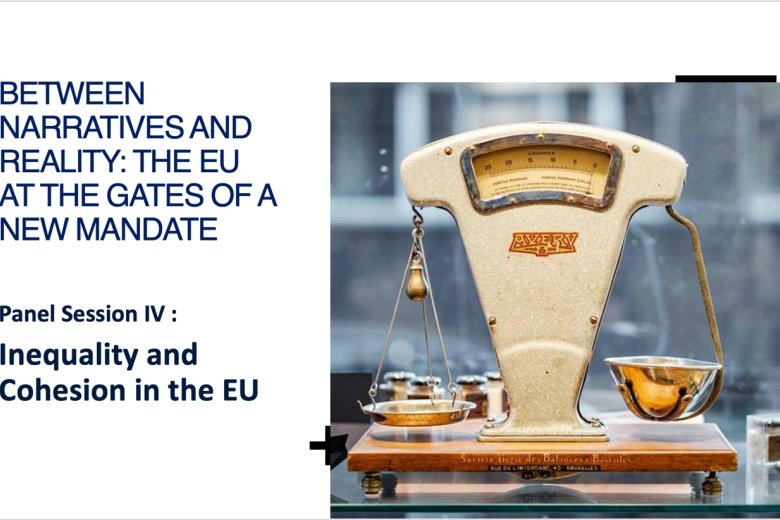Reflection on Panel 3: Migration and Membership
This blog post is part of a series reflecting on the panel discussions held during the conference "Between narratives and reality: The EU at the gates of a new mandate", which took place at the Faculty of Law of Maastricht University on June 20 and 21, 2024. This panel covered issues related to migration and membership.

Chair: Pauline Melin
Speakers: Martijn Pluim, Lisa Senecal, Gamze Avci
While the Union is premised as a border-free zone amongst its Member States, borders are very much present as a delimitation of belonging within the EU and towards the outer world. At the same time, superseding existing borders through further enlargement is the ambition of the EU as a space of shared values. This panel brought together multiple perspectives on the concept of borders and membership, by developing an interdisciplinary dialogue on migration, enlargement and the perception of the border itself. We explored the tensions between borders and the EU founding values and narratives, as well as the interactions between the different dimensions of borders in the EU today.
Martijn Pluim examined the development of EU migration policy from the integration of the to the New Pact on Migration and Asylum. Pluim highlighted how the narrative of “fortress Europe” to describe the Union’s external borders was necessary to allow Member States to agree on the abolition of internal borders. It was thus possible to frame Schengen as a “progressive policy with a restrictive face”. In 2015, the migration crisis shattered the picture of the fortress and triggered Member States’ concerns on the tenability of the Schengen area. The question then is whether the New Pact managed to reinstate trust in the Schengen system while complying with EU values and migrants’ fundamental rights. Pluim concluded that, despite some advancement on fairness and solidarity, the New Pact fosters the externalisation of borders and prioritises security concerns over migrants and asylum seekers’ rights. Thus, arguably, the New Pact constitutes a “restrictive policy with a progressive face”. Since migration is a highly emotional topic, academics, practitioners, NGOs, and policy makers must be careful in ensuring that those emotions do not take over EU values internally and externally.
Lisa Senecal analysed the multiplicity of borders calling into question the assumption that the border is a single concept across space, time, and individual experiences. The presentation focused on the conceptual aspects of borders, showing how (legally, socially and politically) constructed borders shape our thinking and express collective and individual perceptions and beliefs about belonging. Starting from the premiss that crossing a border always requires a sacrifice and the spending of some form of capital (body, human, emotional, financial etc.), Senecal’s field research in Malta identified three groups of borders experiences. Those three groups (EU citizens, legally resident non-EU migrants, non-EU migrants who entered the EU illegally), depending on their legal status and migration journey, perceive themselves and are perceived differently in relation to nationals and see the sacrifice from migration as lower than the gain, equal or worth the gain, or incommensurable. As the research showed, borders are different depending on constructed categories that permeate our thinking. Acknowledging this and the segregating effects of borders could improve the latter’s transparency and ability to align with the values they supposedly protect.
Finally, Gamze Avci examined the enlargement process with a focus on the Pre-Accession Assistance to candidate countries and enlargement conditionality in the context of Turkish accession to the EU. The presentation analysed the evolution of the narrative and discourses surrounding pre-accession funding, noticing how it changed and how it is increasingly politicised. Avci identified some key moments where the narrative shifted and so the EU approach to the disbursement of the funds. The analysis covered both evolutions in the pre-accession policy and process, and the discourses of EU institutions. She concluded that funds are increasingly linked to other kinds of conditionality than the one envisaged in the beginning, now hinging much more on migration and geopolitical security. The contextualization offered by Avci’s presentation, through the study of turning points in the EU institutional discourse, allows us to understand the discrepancy between the objectives of the funding and their use in institutional politics within the EU.
The Chair of the panel, Pauline Melin, started an enriching discussion with the audience and the panellists by reflecting on the common thread of the evolution of narratives as moving targets of our research, the discrepancy between the appearance of a consistent narrative and its actual multiplicity and fragmentation, and the need to account for different (and more humane) perspectives from the individuals who are affected by EU and Member States’ actions when it comes to borders.
Introduction - Between narratives and reality: The EU at the gates of a new mandate
Panel 1: Institutional Change
Panel 2: Environmental Protection
Panel 4: Inequality and Cohesion
L. Díez Sánchez
I am Assistant Professor in EU Law. Before that, I was Inquiries Officer at the strategic team of the European Ombudsman, Teaching Fellow in Law at Sciences Po Paris, and Emile Noël Fellow at New York University (Fulbright-Schuman Scholar).

F. Ristuccia
Fulvia Ristuccia holds a Master’s degree in Law from Roma Tre University (2014), an LLM in European Law from the College of Europe in Bruges (2017), where she was also Academic Assistant in a.y. 2017-2018, and a PhD (cum laude, 2022) from Bocconi University.

-
The Proposal to Reform Comitology is Dead. Long Live Comitology!
This blog was originally published on the European Law Blog on 13 March 2025.
On 11 February 2025, the Commission announced the withdrawal of the 2017 Proposal to reform the Comitology Regulation. The reasons for the withdrawal are rather succinct: ‘[n]o foreseeable agreement – the Proposal is...

-
Reflection on Panel 4: Inequality and Cohesion
This blog post is part of a series reflecting on the panel discussions held during the conference "Between narratives and reality: The EU at the gates of a new mandate", which took place at the Faculty of Law of Maastricht University on June 20 and 21, 2024. This panel addressed inequality and...

-
Reflection on Panel 2: Environmental Protection
This blog post is part of a series reflecting on the panel discussions held during the conference "Between narratives and reality: The EU at the gates of a new mandate", which took place at the Faculty of Law of Maastricht University on June 20 and 21, 2024. This panel discussed Environmental...
